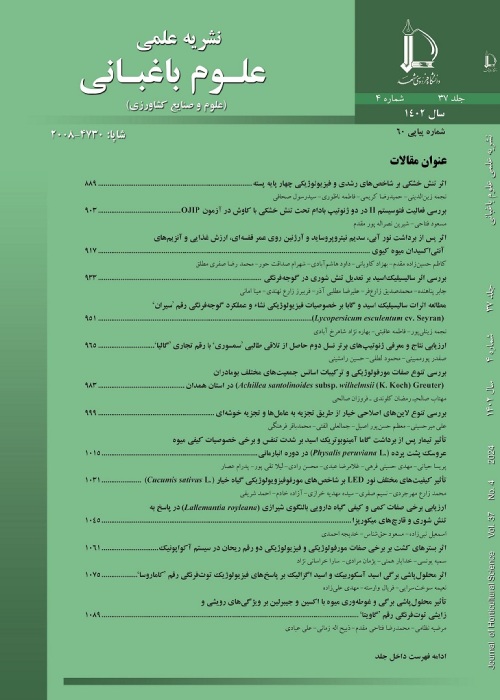Regulated Deficit Irrigation Regime Effects on Vegetative, Oil Yield and Oil Content and Water Use Efficiency of Zard Cultivar
Author(s):
Article Type:
Research/Original Article (دارای رتبه معتبر)
Abstract:
Introduction
Olive (Olea europaea L.) is an ever-green and drought-tolerant tree grown on regions with limited water resources to produce oil and table products. Due to existing appropriate environmental conditions in our country for its growing, and also considering public desperate needs to its oil product, olive is economically considered to be an important fruits to be cultivated. The problem of supplying sufficient water for irrigation olive orchards, due to serious threats of ongoing drought and reduction in water resources, is one of the main limiting factors on the way to develop olive industry in country. Accordingly, some suitable approaches like using tolerant cultivars, mulches, reduction of plant transpiration, plant growth regulators, and recently evaluating proper time for irrigation have been examined to increase efficiency of water use. According to this approach, irrigation schedule is designed mainly based on maintaining plant’s water status internally and regarding maximum level of water potential at particular stages of plant cycling, especially at time of lowest sensitivity of fruit growth to drought stress.
So far, many studies performed over effects of drought stress and water deficit on vegetable growth of olive under pot conditions. With respect to establishing olive orchards on different regions of country and appearing serious drought threats, it is imperative to investigate the effects of regulated irrigation deficit on all bearing fruit trees. Hence, determining the insensitive stages of fruit growth toward regulated irrigation deficit has been received great attentions in terms of economical yield. The purposes behind doing the current study were to investigate and compare effects of different regulated deficit irrigations on vegetative and reproductive parameters of olive grown under field conditions.
Materials and Methods
This study was aimed to investigate the effect of regulated deficit irrigation regime on vegetative, oil yield and oil content and water use efficiency of zard cultivar under field condition. This experiment was conducted in Javanmiri region (Geographical characters was longitude of 58˚, 45΄ E and latitude of 35˚, 34΄ N and the height of sea level 1215m) located in Kermanshah province. An experiment was conducted based on a randomized complete block design with three replications. Adult olive zard cultivar was uesd. Each experiment unit consists of three trees. Vegetative and reproductive traits were evaluated according to I.O.O.C. descriptors. five irrigation regimes including of full irrigation (as control), regulated deficit irrigation (100% of full irrigation during growing season and no irrigation during pit hardening), irrigation in three stages (before flowering, pit hardening and before harvesting), 60% of full irrigation (continuous deficit irrigation) and no irrigation (Rainfed). To evaluate the effect of irrigation regimes, some vegetative traits including current season growth and current season diameter, dry and fresh oil content, fruit mass percent, oil and fruit yield and water use efficiency were measured. Collected data were analyzed using SAS program.
Results and Discussion
Obtained results showed that the highest oil and fruit yield were observed at full irrigation and regulated deficit irrigation (100% of full irrigation during growing and no irrigation during pit hardening, but the lowest one found at Rainfed. The water use efficiency of oil yield of T3 was higher than 100ETc and other treatments.
In the arid and semi-arid as well as sub-tropical regions, water shortage is a normal phenomenon and seriously limits the agricultural potential. Therefore, under irrigation or rain-fed conditions, it is important for the available water to be used in the most efficient way. Regulated deficit irrigation is an optimizing strategy under which crops are allowed to sustain some degree of water deficit and yield reduction. During regulated deficit irrigation the crop is exposed to certain level of water stress either during a particular period or throughout the growing season. The main objective deficit irrigation is to increase water use efficiency (WUE) of the crop by eliminating irrigations that have little impact on yield, and to improve control of vegetative growth (improve fruit size and quality).
Conclusion
According to the results of this research, it can be concluded that regulated deficit irrigation had a significant effect on reproductive traits. Using regulated deficit irrigation improved pomological characteristics of olive including oil and fruit yield under drought stress and helped to save irrigation water in olive orchards.Keywords:
Irrigation , Oil , Olive
Language:
Persian
Published:
Journal of horticulture science, Volume:32 Issue: 4, 2019
Pages:
605 to 614
magiran.com/p1944865
دانلود و مطالعه متن این مقاله با یکی از روشهای زیر امکان پذیر است:
اشتراک شخصی
با عضویت و پرداخت آنلاین حق اشتراک یکساله به مبلغ 1,390,000ريال میتوانید 70 عنوان مطلب دانلود کنید!
اشتراک سازمانی
به کتابخانه دانشگاه یا محل کار خود پیشنهاد کنید تا اشتراک سازمانی این پایگاه را برای دسترسی نامحدود همه کاربران به متن مطالب تهیه نمایند!
توجه!
- حق عضویت دریافتی صرف حمایت از نشریات عضو و نگهداری، تکمیل و توسعه مگیران میشود.
- پرداخت حق اشتراک و دانلود مقالات اجازه بازنشر آن در سایر رسانههای چاپی و دیجیتال را به کاربر نمیدهد.
دسترسی سراسری کاربران دانشگاه پیام نور!
اعضای هیئت علمی و دانشجویان دانشگاه پیام نور در سراسر کشور، در صورت ثبت نام با ایمیل دانشگاهی، تا پایان فروردین ماه 1403 به مقالات سایت دسترسی خواهند داشت!
In order to view content subscription is required
Personal subscription
Subscribe magiran.com for 70 € euros via PayPal and download 70 articles during a year.
Organization subscription
Please contact us to subscribe your university or library for unlimited access!


